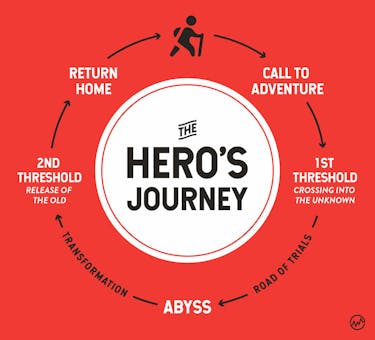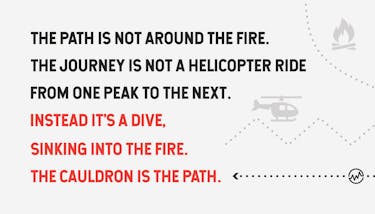

Get Access to 250+ Online Classes
Learn directly from the world’s top investors & entrepreneurs.
Get Started NowIn This Article
Upward. The direction of every signpost on our beloved planet points up. Climb the ladder. Scale the mountain peak. Up towards the heavens. More fame, more fortune, more success and happiness beckon from above. Natural as this upward direction may sound, it doesn’t reflect reality—it’s upside down.
The truth is—it’s not from going up that we grow, learn, develop, become, make progress in life, or achieve anything worth doing at all.
It’s from going down.
The Journey
The Greeks have a word called katabasis. It means “a going down”. It’s a descent into the underworld. A plunge, a dive, a sinking into what’s in front of you.
Joseph Campbell, a writer, professor and historian, knew more about katabasis than most. He studied the myths and stories of the world’s cultures across time and place. His research resulted in a model of human achievement he called The Hero’s Journey.
The hero’s journey is the backbone of every story you’ve read and will read. No matter where you are or where you come from, it isn’t a story if it doesn’t follow the hero’s journey.
How Heroes Become Heroes

The hero’s journey always begins with the hero hearing the call for adventure. Then the hero boldly accepts this calling and leaves security to pass into the First Threshold and into the unknown (and dangerous) world.
In the unknown world, the hero faces a road of trials and challenges. It’s a continuous descent, with harder and more demanding tests arising along the way.
The descent comes to its conclusion in the abyss. There, the hero faces the Supreme Ordeal. It’s a dance with death, with demise. Everything the hero knows to be true is on the line.
In the end, the hero triumphs. But in doing so, the hero gives up or sacrifices something. This is the Second Threshold. It’s a release of the old.
But it’s also a moment of revelation and rebirth. The hero sheds the skin of the past, and gains the insight and wisdom needed to win the day.
With old weight released and the new power gained, the hero returns home a transformed, more whole human being.
Real Life Fiction
The hero’s journey doesn’t only apply to fiction—it’s how we structure our own lives, too. We are the heroes of our own stories. We are nothing but our own life narratives. As we tell our life stories, we construct a narrative that makes sense of who we are, what we’ve been through, and what is to come.
In every life there is a range of peaks. And, without fail, there is at least one abyss. An ordeal. A fire.
We’ve all faced such periods, these valleys of darkness. You might find yourself in one right now. It could be a challenging project at work. It might be a troubling relationship. Or it might be a struggle to figure out who you are and where you’re headed.
If so, you’re faced with two options.
The first option is to avoid the valley and pretend like it’s not there. You might get temporary relief, but it won’t last. There will always be that persistent nagging, an eternal sensation that something’s not quite right.
The second option it to take on the valley, headfirst. You look it in the eyes and you plunge into it. You ride it like a bull, taking on the dragons and the monsters that await you on your journey.
You go down into the valley of fire.
Walking Through The Valley
There are three parts you will experience walking through the valley—each one requiring a bold courage, but undoubtedly worth the payoff in the end.
Look Into The Flames Of The Valley
Even though this raging fire may intimidate you, remember that heat will cook and grow you—it’s part of the process. It’s the challenges that will provide the pressure needed to grow. If it’s uncomfortable, good! Then you know you’re onto something that has the power to transform you.

You are clay. If you avoid the fire, you will remain a heap of wet mud. If you instead plunge into the flames, you will emerge solidified, strengthened, more beautiful, more lasting, more resilient.
Taking the Desperate Leap
How do you collect the courage to plunge into the depths of the valley?
Only through desperation.
Author Henry Miller—for example—tells the story of when he was a struggling artist. For years he did nothing but fail and stagnate. It was only when he confronted this fact—his abyss, his valley, his fire—that he began to transform and to progress in life.
And that transformation only became possible by confronting the truth of himself, and what was on the line.
“To fail as a writer meant to fail as a man. And I failed,” Miller said.
“I realized that I was nothing—less than nothing—a minus quantity. It was at this point, in the midst of the dead Sargasso Sea, so to speak, that I really began to write … I had to grow foul with knowledge, realize the futility of everything, smash everything, grow desperate, then humble, then sponge myself off the slate, as it were in order to recover my authenticity. I had to arrive at the brink and then take a leap in the dark.”
For Miller, there was no other option than to take a leap in the dark.
You will only take on the valley if there is no other option. The pain of not diving in must be worse than the pain of doing so.
If you can live without the dive, without going into the abyss and striving for what’s on the other side . . .then it’s never going to happen.
Reducing To The Core
After your desperate plunge into the valley, let the flames do their work.
It’s like the reduction of a red wine sauce. If you let the flame heat it for long enough, the alcohol fumes and the water will evaporate. You’re left with nothing but the essence. It’s a cleansing, a purifying of the core.
Thomas Merton, monk and writer, writes how the cooking of those layers can feel like a downright tragedy at the time.
“What a holocaust takes place in this steady burning to ashes of old worn-out words, clichés, slogans, rationalizations,” Merton writes. “It is a terrible breaking and burning of idols, a purification of the sanctuary, so that no graven thing may occupy … the center, the existential altar which simply ‘is.’”
As you cook in the fire, the layers that you thought you needed, that you thought were part of you, release. They vanish, leaving that which simply “is".
There is a shedding that takes place. There’s a lightness that emerges, but also strength.
Strength within the lightness, and strength because of the lightness.
There’s less weighing you down. You feel less burdened and more room to move and breathe. There’s a newfound nimbleness and a sense of flow. The light from within shines brighter, and the feeling of freedom expands.
Henry Miller recounts how his leap into the dark brought forth his own voice and his wholeness. “I began from scratch, throwing everything overboard, even those whom I most loved,” Miller wrote.
“Immediately I heard my own voice. I was enchanted: the fact that it was a separate, distinct, unique voice sustained me. It didn’t matter to me if what I wrote should be considered bad. Good and bad dropped out of my vocabulary … I had found a voice, I was whole again.“
Going Up By Going Down

We talk about making progress in life by climbing peaks and conquering mountains. But it isn’t about the mountain. It’s about the valley.
When you look into the depths of the valley, it can seem dark. But it’s when the night is at its darkest that the stars shine the brightest.
It’s in the dark of the night, in the heat of the fire where we’re made. And it’s in that “deep but dazzling darkness” that we begin to see clearly.
If you take on the valley of fire and let it cook you, you’ll feel the heat of the flames. But before you know it, you’ll realize that you’re soon on top of the next mountain. You’re stronger, you’re freer, you’re lighter.
It seems like magic—you’re up higher than you ever thought you would be.
And all by going down.






